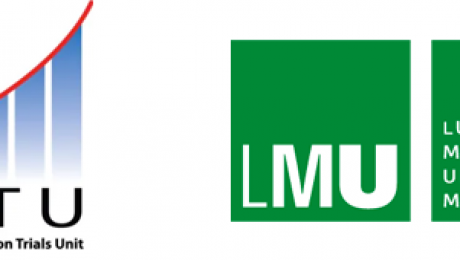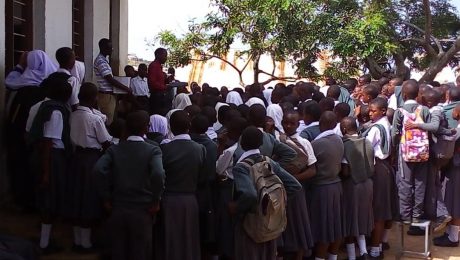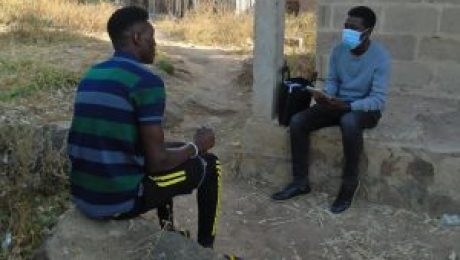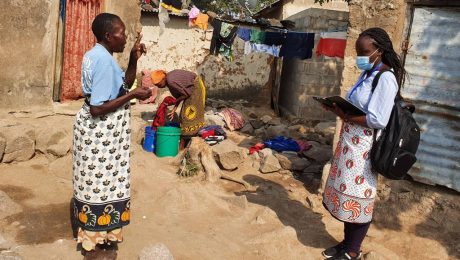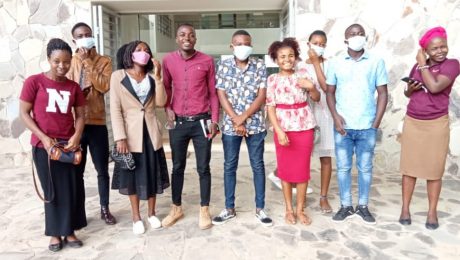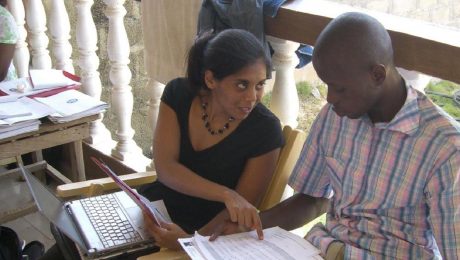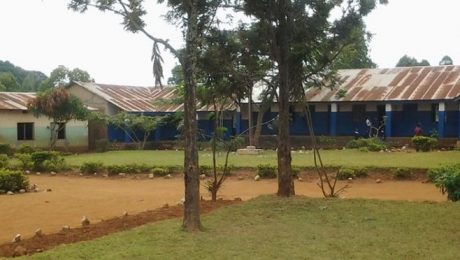Today, both for-profit and non-profit organisations have recognised the value of collaborations. Collaboration among researchers ensures that their knowledge, skills, and techniques are shared, and this could benefit people who participate in the research. The more researchers collaborate, the greater are the chances for success in finding solutions for major global health problems.

In line with its mandate, MITU collaborates closely with a number of local, regional and internationally leading research and academic institutions. The most recent collaboration is with Ludwig-Maximilians-Universität (LMU) Munich in Germany. This collaboration was initiated by Prof Heidi Stöckl who recently moved to LMU, together with her ongoing collaborative research projects with MITU, after twelve years of service at the London School of Hygiene and Tropical Medicine (LSHTM).
This move has created an opportunity for MITU to collaborate with LMU in an ongoing longitudinal study on intimate partner violence in Mwanza, Tanzania. Prof Stöckl and Dr Gerry Mshana at MITU are leading this research. Prof Stöckl said this research ‘’is one of the few longitudinal studies that can investigate change in intimate partner violence and its risk and protective factors over time, therefore providing crucial information on how to prevent this form of violence against women in low and middle income countries. At the same time, our cross-sectional survey of young men is quite crucial in this field, where little is known about young men and the reasons for perpetrating violence or experiencing violence themselves’’.
While this new collaboration is currently focused on completing the ongoing research study, more collaborative opportunities between the two institutions are expected in the future
Studies have shown that high blood pressure (BP) among children and adolescents is relatively common, although only a few have been conducted in Africa. Scientists from the Mwanza Intervention Trials Unit (MITU) recently published a report in the journal of Scientific Report – Nature which shows that adolescents with high BP in Tanzania can be identified in school settings and linked to routine health care services. This study was conducted in 2018 among 500 students aged between 11-15 years from three public secondary schools within Mwanza city.

Introducing the study to the students in one of the participating schools

Introducing the study to the student’s parents/guardians and requesting for their consent
Dr Mussa Kelvin Nsanya – a researcher at MITU and the study lead author – said that, “Adolescents with high BP in Africa can be identified using multiple BP measurements taken at multiple steps in a span of days to months followed by a 24-hour BP monitoring for confirmation. In addition, schools could save as an effective platform for screening of high BP and raising awareness to cardiovascular diseases”.

Taking BP measurements from one of the study participants in a secure and quiet improvised cubicle at a school setting.
Findings from this study showed that 50 out of 500 adolescents (10%) had sustained high BP on repeating BP measurements at three different occasions. Using BP measurements taken over 24 hours, investigators of this study confirmed that 13 (2.6%) adolescents had high BP. MITU scientists are continuing to follow-up participants enrolled in this study in order to identify those with high BP and examine factors related to long-term changes in BP measurements.
MITU is carrying out research with young men to understand intimate partner violence in Mwanza city.

Male research assistant interviewing a young man using a tablet
MITU in collaboration with the London School of Hygiene and Tropical Medicine and Ludwig Maximilian University of Munich, Germany has received funding from the European Research Council to conduct a study among 1,000 young men aged 18-24 years in Mwanza city, Tanzania. The purpose of this study is to investigate the patterns and factors that cause intimate partner violence in the study population.
Between June and December 2021, young men from 24 streets across the city will be invited to take part in the study and those who agree to participate will be interviewed. A team of 9 researchers is carrying out the survey in the streets located in 6 wards in Nyamagana and Ilemela districts of Mwanza city. The interviews cover a range of topics about the lives of these young men and their views and understanding of the different forms of intimate partner violence, its causes and possible ways for preventing it.

The young man completing the interview himself on the tablets
The interviews are carried out using hand held computer tablets – a modern data collection technique. In some parts of the interviews, the young men are given the tablets and head phones to listen to the questions and enter the responses by themselves. This ensures that they are part of the research process and safeguards the confidentiality of their responses.
Dr. Gerry Mshana, a senior researcher at MITU and lead scientist for this study said: “Intimate partner violence is a major problem hindering the health, wellbeing and development of children, young people and adults in Tanzania and other parts of the world. We are very pleased for the opportunity to carry out this important and unique study to generate evidence from young men in Mwanza on the magnitude of the problem and their views about it. The results will increase our understanding of the problem and help in designing appropriate interventions and policies in Tanzania and in other similar low-income countries.”
On 26 May 2021, MITU started conducting a survey to collect data that will help to evaluate a reproductive health programme known as “Adolescent 360” or A360. The A360 programme was implemented by the Population Services International (PSI) in 10 regions in Tanzania mainland, including the Mwanza region, and was targeting girls aged 15 to 19 years.

The survey is being conducted in 15 wards of Ilemela district in Mwanza city. In each ward, two streets will be selected by lottery to participate in the study and later visited by trained female research assistants to identify households with girls aged 15 to 19 years. Once this exercise is completed, female research assistants will visit the homes of identified girls to inform them about the study, obtain their consent to participate in the study, and conduct a detailed interview in a private location. Research assistants will also separately interview a sample of adults who live with the interviewed girls. MITU would like to find out whether the A360 programme helped to improve what girls’ knew about family planning (ways to delay or prevent pregnancy), and whether the programme made it easier for girls’ to use family planning services if they wanted to avoid or delay getting pregnant.

More than 5,000 girls will be involved in this survey which is expected to be completed by the end of September 2021. MITU received funds to conduct this survey from the Bill and Melinda Gates Foundation and the Children’s Fund Foundation.


Joint Statement by the Heads of the World Bank Group, International Monetary Fund, World Health Organization, and World Trade Organization
The Heads of the World Bank Group, International Monetary Fund, World Health Organization, and World Trade Organization today convened for the first meeting of the Task Force on COVID-19 Vaccines, Therapeutics and Diagnostics for Developing Countries. They issued the following joint statement:
“As many countries are struggling with new variants and a third wave of COVID-19 infections, accelerating access to vaccines becomes even more critical to ending the pandemic everywhere and achieving broad-based growth. We are deeply concerned about the limited vaccines, therapeutics, diagnostics, and support for deliveries available to developing countries. Urgent action is needed now to arrest the rising human toll due to the pandemic, and to halt further divergence in the economic recovery between advanced economies and the rest.
We have formed a Task Force, as a “war room” to help track, coordinate and advance delivery of COVID-19 health tools to developing countries and to mobilize relevant stakeholders and national leaders to remove critical roadblocks—in support of the priorities set out by World Bank Group, IMF, WHO, and WTO including in the joint statements of June 1 and June 3, and in the IMF staff’s $50 billion proposal.
At today’s first meeting, we discussed the urgency of increasing supplies of vaccines, therapeutics, and diagnostics for developing countries. We also looked at practical and effective ways to track, coordinate and advance delivery of COVID-19 vaccines to developing countries.
As an urgent first step, we are calling on G20 countries to (1) embrace the target of at least 40 percent in every country by end-2021, and at least 60 percent by the first half of 2022, (2) share more vaccine doses now, including by ensuring at least 1 billion doses are shared with developing countries in 2021 starting immediately, (3) provide financing, including grants and concessional financing, to close the residual gaps, including for the ACT-Accelerator, and (4) remove all barriers to export of inputs and finished vaccines, and other barriers to supply chain operations.
In addition, to enhance transparency we agreed to compile data on dose requests (by type and quantity), contracts, deliveries (including through donations), and deployments of COVID-19 vaccines to low and middle-income countries—and make it available as part of a shared country-level dashboard. We also agreed to take steps to address hesitancy, and to coordinate efforts to address gaps in readiness, so countries are positioned to receive, deploy and administer vaccines.”

On 11th May 2021, a group of 10 second year undergraduate sociology students from St. Augustine University of Tanzania (SAUT), Mwanza branch visited our unit as part of the study tour. These students’ interest was to understand the contribution of the Mwanza Intervention Trials Unit (MITU) in solving public health problems.
After an official introduction and tour of MITU facilities, the group was invited for a discussion led by three scientists within the unit: Dr Elialilia Okello (Senior Social Scientist), Dr Kenneth Makata (Public Health Specialist) and Onike Mcharo (Social Scientist). The discussion adhered to proper COVID-19 preventive measures. During the discussion, students were given information about a range of research studies conducted in the Unit.
The students had a chance to ask questions to the researchers about MITU’s contribution in addressing public health problems. At the end of the discussion, the students provided positive feedback on their understanding of MITU’s roles and its contribution towards solving public health problems in the region.
The Mwanza Intervention Trials Unit (MITU) based at the National Institute for Medical Research (NIMR) campus in Mwanza, (Tanzania) is a collaborative research unit of NIMR and the London School of Hygiene and Tropical Medicine (LSHTM). MITU’s mission is to contribute to improving health through the development and evaluation of interventions against HIV and other health problems by conducting research, including clinical trials, to the highest international standards; to enhance the capacity to carry out such research in Tanzania and the East African region; and to contribute to the translation of research findings into health policy.
MITU, in collaboration with LSHTM and five other African institutional partners, is part of the ENTRANT training fellowship programme which seeks to develop a critical mass of infectious disease epidemiologists to work with the Ministries of health and their academic and research partners, to prevent and respond to emerging outbreaks and public health emergencies. The programme, funded by the European & Developing Countries Clinical Trials Partnership (EDCTP), will support 15 African scientists over two academic years (2021-2023) to complete a one-year full-time MSc degree in Epidemiology at the LSHTM. At least two fellows will be from Tanzania. In addition to the MSc taught courses, fellows will also complete an LSHTM short- course on pandemic preparedness, response and research led by members of the Uk Public Health Rapid Support Team (UK-PHrSt) and a three-month MSc research project carried out in Tanzania.
The other African institutional partners collaborating in this consortium are:
- National Health Laboratory (NHL), Botswana
- Haramaya University (HU), Ethiopia
- University of Nairobi (UoN), Kenya
- MRC/UVRI & LSHTM Uganda Research Unit (MUL), Uganda
- ZAMBART Project Limited, Zambia
Award Details:
Eight places are available for 2021-22 academic year and each fellowship includes:
- 2021-22 tuition fees (at the overseas fee rate)
- Stipend (living allowance) of £16,800
- Return air travel to London
- An allowance for MSc research project expenses
- Support to attend conferences and networking events after completion of the MSc
To be eligible, candidates must:
a) Be a resident and national of Tanzania.
b) Hold a minimum of an upper second-class honours degree from a reputable university in Tanzania or other countries, or a registerable qualification in medicine, dentistry or veterinary medicine.
c) Be working with either the Ministry of Health, Community Development, Gender, Elderly and Children or at the Institutes of Public Health at Muhimbili University of Health and Allied Sciences (MUHAS), and Catholic University Health and Allied Sciences (CUHAS) or School of Public Health at Kilimanjaro Christian Medical College (KCM college), or Research Institutes at the National Institute for Medical Research (NIMR),Ifakara Health Institute (IHI) and Kilimanjaro Christian Research Institute (KCRI) or at the University of Dodoma. Applicant employer will need to provide a letter of support guaranteeing that the fellow will be released from work commitments for the full one-year period of the MSc, and that the fellow’s post or an equivalent role will be available for them to return to following completion of their studies. The letter should also express support for the fellow to have protected time (recommended one day per week for a 10-week period) to undertake the pandemic short course following the MSc.
d) Have at least 2 years and less than 15 years’ full-time equivalent work experience since completion of their first degree.
e) Be able to meet English language requirements for the LSHTM MSc Epidemiology specified here https://www.lshtm.ac.uk/sites/default/files/english language requirements policy.pdf
f) Be committed to continue working as a public health practitioner in Tanzania for a minimum of two years after completing their studies.
How to apply:
Candidates should complete their application through the online portal https://fellowship.lshtm.ac.uk/#/get- started. Applications will be accepted from 1st – 30th April 2021.
Please note:
The online application system includes a personal statement section. Candidates should use this section to give further details on their current role in public health and how they will be in a position to contribute to public health activities and disease outbreak preparedness and response activities following completion of the MSc. They should also set out their commitment to remain working as a public health practitioner in Tanzania for a minimum of two years after completing their studies.
Documents that must be uploaded as part of the application are listed below:
- Curriculum vitae
- Academic transcript
- Letter of support from current employer, including the information specified in point c) above.
Applications received after the closing date will not be considered. Shortlisted candidates will be interviewed via Zoom.
Support will not be given as a supplement to other funding, nor to students who have funding from other sources.
Enquiries
Find out more about the MSc in Epidemiology.
Informal enquiries concerning the fellowship can be made to jchangalucha@yahoo.com, saidi.kapiga@lshtm.ac.uk or Emily Webb.
Informal enquiries concerning the MSc can be made to the Programme Directors.
Find out more about visa requirements.
Background
Gender-based violence is prevalent globally.
It occurs in many forms, including intimate partner violence, rape and coerced sex, child sexual abuse, and human trafficking. Such forms of gender-based violence are significant risk factors for poor health, impacting on individuals’ physical, sexual and psychological health, as well as their social and economic well-being.
Evidence from rigorously conducted research is essential to ensuring that policies and services to prevent and respond to violence are well-designed and appropriate to the context where women, children, adolescents and men live. Conducting action-oriented research on gender-based violence that is robust and carried out in ethical and safe ways requires specific methodological approaches.
The course
This course aims to strengthen participants’ knowledge and skills to conduct or commission technically rigorous, ethical and policy- and service-relevant research on various forms of violence against women, children and adolescents.
It is intended for individuals who will conduct or commission research on gender-based violence. It will be of particular interest to those who want to add a ‘violence component’ to a study that is quantitative or qualitative or an intervention evaluation.
It is relevant for individuals working on health-related topics such as sexual and reproductive health, maternal health, HIV, mental health and substance use.
The course will be taught through a series of online interactive lectures, practical exercises, group work and assigned reading.
Course content
The course will cover topics including:
- Conceptualising and researching various forms of gender-based violence
- Associations between violence and health: current knowledge
- Ethics and safety
- Approaches to researching violence: qualitative, quantitative, mixed methods, intervention research
- Developing conceptual frameworks for violence and health research
- Survey research on violence and questionnaire design
- Intervention research: approaches and challenges
- Violence research in health care settings
- Violence research in humanitarian settings
Key information
Course Organisers:
Dr Karen Devries, Dr Cathy Zimmerman and Dr Ana Maria Buller
The course will also feature lectures from Prof Charlotte Watts and visiting staff from other universities.
Duration: 17-28 May 2021
Fees for 2021: £850
Contact email: shortcourses@lshtm.ac.uk
Find out more and apply: www.lshtm.ac.uk/study/short-courses/gender-violence
Results from this study highlight the importance of maintaining and increasing vaccine coverage to sustain gains made in reducing deaths related to infectious diseases in low-and middle-income countries.

Primary school from Kagera region.
In recent years, handwashing with soap has been gaining recognition as an important practice for maintaining good health. Many international organisations, including the World Health Organization (WHO), have taken part in promoting regular handwashing with soap. This is mainly because current scientific evidence shows that handwashing with soap reduces transmission of infectious agents and is an effective means to prevent infections.
Since the effectiveness of handwashing is well-established, the scientists at the Mwanza Intervention Trials Unit (MITU) are working to include this practice as part of a package of public interventions aiming to combat worm infections among primary school children in Kagera region, northwestern Tanzania. Recently, Dr. Kenneth Makata and his colleagues published an article in PlosOne that describes their work, which uses handwashing with soap as a tool to reduce the burden of common worm infections (namely Ascaris lumbricoides and Trichuris trichiura) in the study population. This article presents results of a survey which was conducted before the implementation of a large study aiming to assess the effectiveness of a range of measures, including handwashing with soap, in reducing the chance of getting new worm infections following mass treatment of school children.

Handwashing facility with painted nudges from one intervention school.
It is interesting to note the innovation that goes into the design of this research project. Dr. Makata and his colleagues installed handwashing facilities close to the latrine building in 8 primary schools taking part in this study in 3 districts of Kagera region.
Each facility had replenishable pieces of soap to be used. The team also painted the pathways linking latrines and handwashing facilities to make them look friendly and to sub-consciously motivate the school children to use the facilities to wash hands. Teacher-led classroom teaching and sessions to involve parents were also provided as part of the package.
“We were very pleased to see school children highly motivated to use the facilities after their installations,” said Dr. Makata who coordinated all activities related to this study in Kagera. “Our study confirms that worm infections among school children are a major health problem in Kagera region”. Results of the main study have been submitted for publication.


